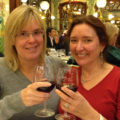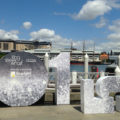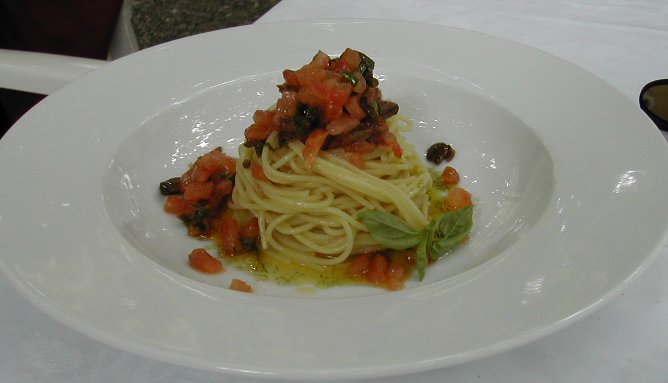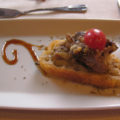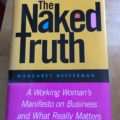Millions of people have put up websites: many in hopes of making money one way or another; many, like myself, because we have something to share with the world, and don’t care whether it makes any money or not. On the other hand, making money wouldn’t hurt…
As I have mentioned, and you have no doubt noticed, I’m using Google’s AdSense service to place ads on my site, for which I get paid when visitors click on any of the ad links. I started this mostly to see how it works (my professional field – well, one of them – is online marketing), and it’s even earning a bit of money. Not nearly enough to pay for all the time I spend doing the site, but more than enough to cover my hosting costs. It’s interesting to see which pages generate the most revenue. I can try to guess from that which links are paying the most and why, and which are most likely to be clicked on (the living in Italy section is the most lucrative, though it’s also one of the larger sections, so there are more links to be clicked).
My site now gets over 500 visitors a day (NB: as of Dec, 2006, the number of visitors has doubled), a fact which has been noticed by companies who sell link exchange services to help boost traffic to their clients’ websites and improve their search engine rankings (that is, show up higher in the list of results when you search on a certain term in Google, Yahoo, etc.). Their pitch usually begins: ” am contacting you about cross linking. I am interested in your site because it looks like it’s relevant to a site for which I am seeking links.” This is most often followed by mention of a site which has no conceivable relevance to mine, such as one about specialized business products including caution tape and barricade tape. I ignore these offers.
I have exchanged links with a few sites which truly are relevant, and happily link to some friends’ sites which may be of interest to my readers. But I’m becoming reticent about linking to just any old site about, e.g., tourism in Italy. Due to the amount of qualified traffic that comes to my site every day, a link from me is now actually worth something: it helps new sites get noticed faster by Google, and directs desirable (and not just random) visitors to relevant sites.
I’m not really set up to monetize and manage the value of such links, though, so I’ll just have to evaluate whether the requesting linkee can provide equal value in return. So far the track record isn’t good. I was recently asked to allow some of my articles to be used on a new site for expatriates in Italy – –We’ll put in your name and a link– was the offer. I have given away a few articles in the past, in exchange for links, in order to build traffic from sites which I knew had a lot more visitors than I did. But it makes no sense for me to give away content to a brand new site – I have far more traffic than they do at the moment. (I explained all this to the guy behind the new site, and he agreed that they might consider paying me.)
I’m also not equipped to require a subscription to my newsletter – even if I wanted to, which I don’t. But, in case anyone’s inclined to contribute something, I’ve added an Amazon Wish List link.
This is partly a sociological experiment. Some people are reportedly making enough money to live on from purely voluntary donations: Bram Cohen, the creator of BitTorrent, for example. Jason Kottke, a popular blogger, recently announced that he hoped to do the same. Kottke evidently has a large and enthusiastic following, to even undertake such an experiment. Cohen has created something truly useful (not just to pirates) and deserves to be paid for it (I really must get around to that one of these days…).
I doubt that my material would engender or even deserves such monetary affection, but what the heck – the worst that can happen is I get pleasantly surprised someday by a contribution! I have seen a couple of examples of people offering their readers the chance to express appreciation via an Amazon wish list, so I’ve added links to mine. And I suppose my wish lists offer more insight (as if any was needed!) into my personality.
The Amazon experiment continues: whenever I happen to mention a book or movie that I like, I put a sponsored link on my site so that, if you click through from my site and actually buy something, I get a small commission. It appears that if you follow a link from my site to Amazon and then click around and buy something else, I still get money, even if it’s an item not mentioned on my site. Someone recently bought a very expensive set of headphones after arriving at Amazon from my site, so by the end of the month I’ll receive a gift certificate from Amazon (which I will immediately spend on books). Millions of people have put up websites: many in hopes of making money one way or another; many, like myself, because we have something to share with the world, and don’t care whether it makes any money or not. On the other hand, making money wouldn’t hurt.
I’m also not equipped to require a subscription to my newsletter – even if I wanted to, which I don’t. But, in case anyone’s inclined to contribute something, I’ve added an Amazon Wish List link.
This is partly a sociological experiment. Some people are reportedly making enough money to live on from purely voluntary donations: Bram Cohen, the creator of BitTorrent, for example. Jason Kottke, a popular blogger, recently announced that he hoped to do the same. Kottke evidently has a large and enthusiastic following, to even undertake such an experiment. Cohen has created something truly useful (not just to pirates) and deserves to be paid for it (I really must get around to that one of these days…).
I doubt that my material would engender or even deserves such monetary affection, but what the heck – the worst that can happen is I get pleasantly surprised someday by a contribution! I have seen a couple of examples of people offering their readers the chance to express appreciation via an Amazon wish list, so I’ve added links to mine. And I suppose my wish lists offer more insight (as if any was needed!) into my personality.
The Amazon experiment continues: whenever I happen to mention a book or movie that I like, I put a sponsored link on my site so that, if you click through from my site and actually buy something, I get a small commission. It appears that if you follow a link from my site to Amazon and then click around and buy something else, I still get money, even if it’s an item not mentioned on my site. Someone recently bought a very expensive set of headphones after arriving at Amazon from my site, so by the end of the month I’ll receive a gift certificate from Amazon (which I will immediately spend on books).







